TRADITIONAL FUNERAL IN THAILAND
Funerals in Thailand are regarded as important events because they represent rebirth and the passage from one existence to another.
งานศพ or "GNAN SOP" means ceremony for deceased persons. A feast is organised to honor the deceased person. The ceremony date is scheduled by monks.
| When somebody dies, the corpse is kept 7 days in the house before the cremation. During six evenings, monks come and pray. On the coffin, light garlands and a picture of the deceased person can be found. For poorer people, the dead body can be cremated between 3 to 7 days. The formalin used to reduce body decomposition is expensive for poor people. | 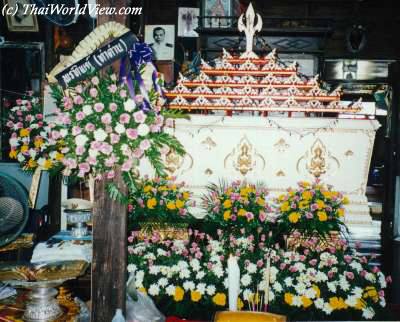 |
| Funeral |
|---|
Guests come, often dressed with dark clothes and sometimes a white shirt. Everybody greet each other. Waiters offer water or coke. From the first to the sixth day, monks come every evening around 7 p.m. On the seventh day cremation happens during the afternoon. Usually 4 monks are coming during the evening prayers. But number can vary depending on the status and rank of the deceased person. Then they summon incantations in Pali language during 30 minutes. When prayers are over, a car brings the monks back to their temple.
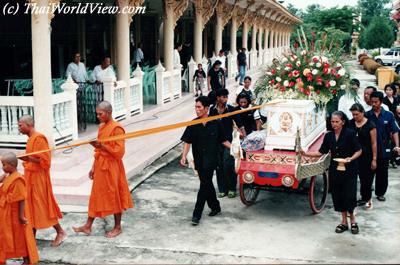 | 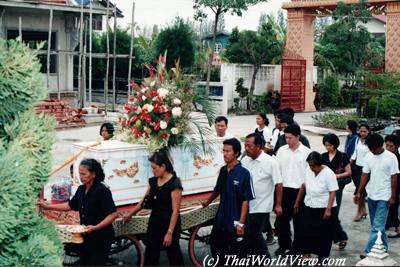 |
| Carrying coffin to the Buddhist temple | Carrying coffin to the Buddhist temple |
|---|
Food is then offered to every guest. Everybody is chatting. Even during the monks prayers, some people are still chatting. Atmosphere is not so sad, there are no loud tears. Family, relations, neighbours and even unknown people to the family can assist to those prayers. Sometimes an old and famous monk is present but doesn't take part in the ceremony. His presence indicates that the deceased person had a high rank.
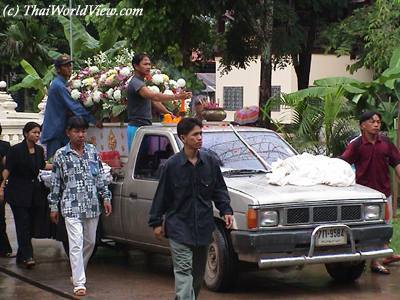 | On the seventh day, in traditional ceremonies, a funeral procession is organized. First monks go ahead, then the men and the women. The men carry the coffin. Nowadays the coffin is often directly transported by car to the temple. |
| Carrying coffin to the Buddhist temple |
|---|
Guests are then arriving to the temple. Everybody is giving gifts, money for the family of the deceased person.
| On the contrary of foreign countries, funeral ceremony is not a sad event. Everybody talk. For Buddhist people, death is only a passage to next life. Corpse is burned to allow the spirit to escape. | 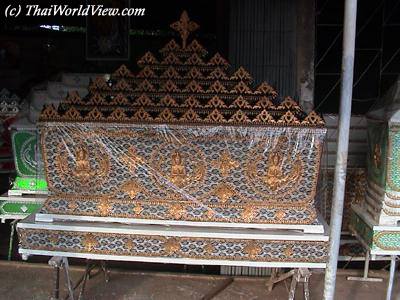 |
| Buddhist coffin |
|---|
In some families, a book is printed and given during the funeral ceremony. This book contains the story of the deceased person, poems, some personal writing. This custom is high valued in Buddhism. The aim is to spread wisdom and knowledge to other persons. In Bangkok, there is even a small museum in "WAT BONIWET", which contains many funeral books. Since a few years, there is a bad business. Some people go to funeral, even if they don't know the deceased person only to get the book and to sell it on specialised market.
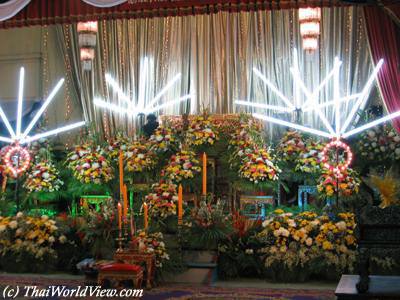 | For important funeral, the family might rent some Traditional Thai orchestra. Musicians are playing gamelan, Thai xylophones... |
| Buddhist coffin |
|---|
One problem with dead persons with no relatives in Thailand is what to do with the unclaimed bodies. When bodies are unclaimed, nobody pays to cremate the corpses. Cremation of dead bodies is one of major aspect of Buddhism, it allows the soul to quit the body and to go to hell or heaven in order to wait to next reincarnation. In Thailand there are some charitable organisations that take the unclaimed bodies and bury them in their private cemetery. Each year many corpses are exhumed, monks are invited and a big burning ceremony is organised. In 1998, in one ceremony 40000 corpses were cremated. With economic recession, those foundations don't have enough money to buy more land in order to expand the location where bodies are buried. Some hospitals are full of unclaimed bodies and do not know what to do with them, so they warn about using garbage incinerator!
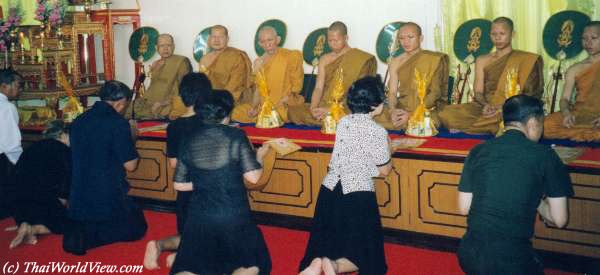 |
| Funeral |
|---|
During the ceremony, all guests have hand palms closed doing the Thai greeting ("WAI" - ไหว้) gesture and "WAI" several times during the monks prayers. Monks prayers are about the impermanence of life (พิธีสวดพระอภิธรรม - pray for funeral).
| The corpse is burnt inside the temple in a big and tall chimney (พิธีฌาปนกิจ - cremation). For up-country temples, which do not have a special building with an oven, the corpse is burnt outdoors. That can lead to horrible scenes when the coffin explodes due to the fire and the corpse appears like a living dead. That is why in old days, pregnant women were not allowed to see outdoor cremations. Such a scene could have frightened them and cause problems to the baby. | 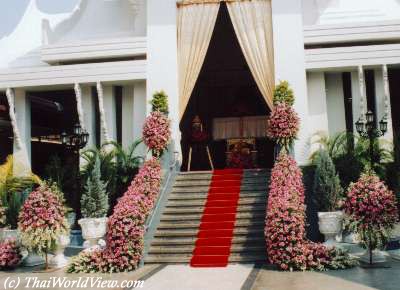 |
| Cremation |
|---|
For big funerals involving influential and powerful families, up to 1000 persons can attend.
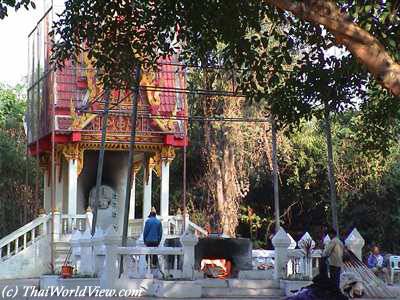 | When paying homage to the deceased person, one makes the Thai greeting or "WAI" (ไหว้) with one incense stick only. One stick is used for deceased person and three sticks are used for Buddha. The crematorium is also called funeral pyre (เมรุตั้งศพ). |
| Crematorium |
|---|
One hundred days after the death, a Buddhist ceremony is done in order to perform final prayers. It is called ทำบุญ 100 วัน or"THAM BUN 100 WAN". Monks are invited (ทำบุญเลี้ยงพระ) to perform prayers. สังฆทาน or "SANG KHATHAN" are offered to Buddhist monks. Envelopes with banknotes are also given. It include miscellaneous items such as washing powder, medicine, monks clothes, fruit juice, candles, matches, soap, umbrella, sandals, lights, milk, tins, tooth paste and brush, water, toilet paper and so on... Ceremony สาดน้ำ or "SAT NAM" is also performed. It is the action of pouring holy water on the floor. To give strength and good blessing to spirits, Thai people pour water on the floor to honour the dead. It helps them to shorten the time to wait for next life.
In the past, some rich families may hired an outdoor cinema (หนังกลางแปลง) to play movies every night until the cremation. In exceptional cases, movies projection would happen during 100 days in order to reach this symbolic date (ทำบุญ 100 วัน).
งานศพ or "GNAN SOP" means ceremony for deceased persons. A feast is organised to honor the deceased person. The ceremony date is scheduled by monks.
| For poor people, the dead body is cremated between 3 to 7 days. For rich people, the dead body is placed in a morgue between 3 to 7 days after the death. The body is left to become dry 100 days. It can be up to 6 months for a Prince and one year for a King. | 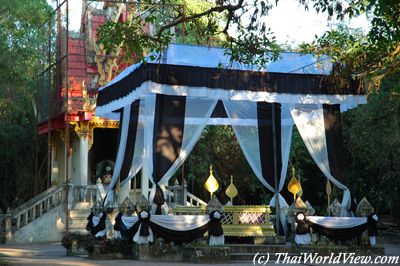 |
| Funeral |
|---|
Before cremating a body, a last rite is performed. The dead body's face is washed with the juice of a green coconut. This water is supposed to purify the deceased.
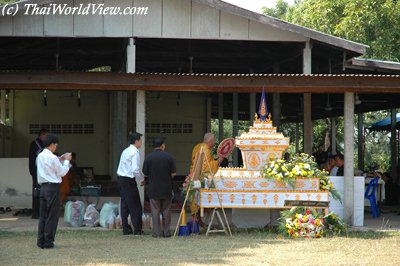 | Funeral don't happen on Friday ("Wan Suk" - วันศุกร์) as "Suk" means happiness in Thai language. |
| Funeral |
|---|
On the cremation day, the coffin is carried from the home to the Buddhist temple. At the head of the funeral cortege, there are monks and the deceased's son or grand-son who become temporary monks for this funest occasion. They hold a sacred thread which is attached to the coffin.
| One son is holding his father's portrait. Monks are following him holding sacred threads. They walk three times around the funeral pyre. | 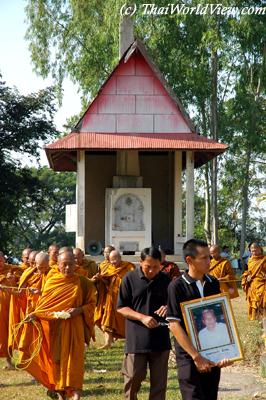 |
| Funeral |
|---|
The undertaker puts a coin inside the mouth of the deceased. This coin is called เงินปากผี. It is used to pay fees during his long journey.
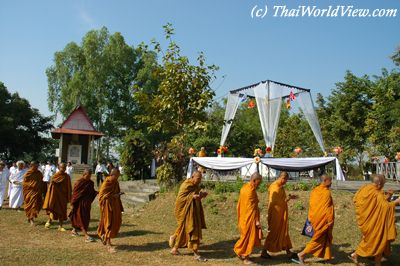 | The undertaker binds the deceased neck, wrist and ankles with sacred thread. The neck represent the burden of having children, the wrist represent the link with his wife and the ankles represent the material goods that the deceased has tried to get during his whole life. |
| Funeral |
|---|
Monks walk three times with the coffin around the funeral pyre. These three times walk are linked to Buddhist beliefs, i.e. life impermanence, the life suffering, the life vaccuum.
| The men shall carry the coffin three times around the funeral pyre. | 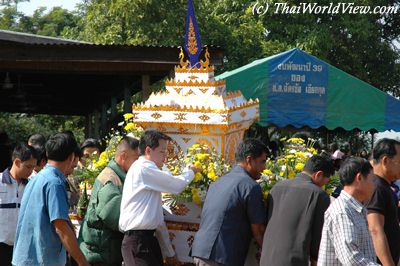 |
| Funeral |
|---|
Before the cremation ceremony, guests lay down flowers, incense sticks and candles in front of the coffin.
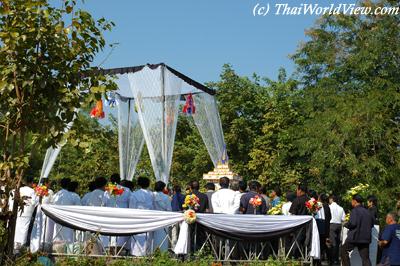 | When the body is cremated, the soul (วิญญาณ) is released. |
| Cremation |
|---|
After cremation, remaining ashes are buried in the cemetary for poor people. For rich people, ashes are stored in a cinerary urn (โกศ) kept at home or inside small niches in temple walls or under a small pagoda.
| The real cremation is done only with close relatives as it can be a long process. Guests can leave earlier. | 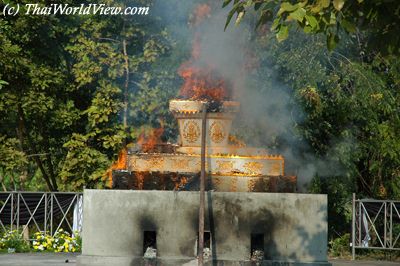 |
| Cremation |
|---|
People were especially afraid of ghosts during wakes. Nowadays this is less true. Sometimes people want monks to leave as soon as the funeral rites are over so that they can drink and gamble!
งานศพ or "GNAN SOP" means ceremony for deceased persons. A feast is organised to honor the deceased person. The ceremony date is scheduled by monks.
| Once the body has been cremated and ashes stored in a small pagoda, regular ceremonies including giving food to deceased relative do happen. | 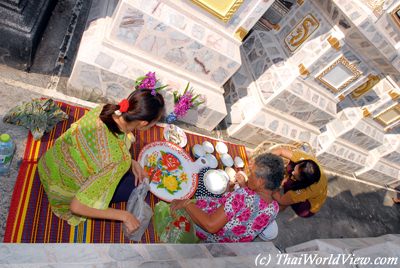 |
| Buddhist cemetary |
|---|
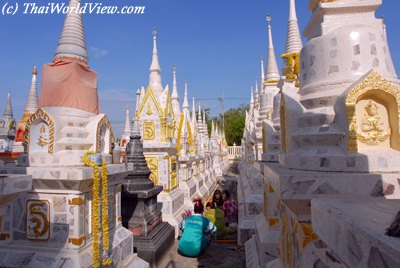 | Food is offered in front of the small pagoda ("CHEDI" - เจดีย์) where bones and ashes are kept. |
| Buddhist cemetary |
|---|
| Many pagoda are present in this cemetary located inside the compound of the Buddhist temple. | 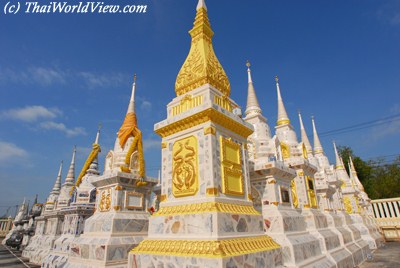 |
| Buddhist cemetary |
|---|
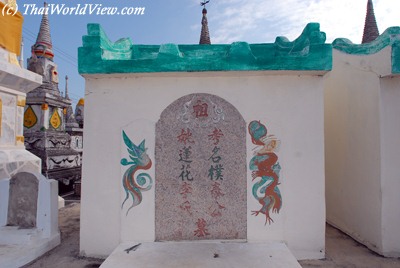 | The cemetary includes Buddhist pagodas but also Chinese type small buildings to store ashes. |
| Buddhist cemetary |
|---|
| Despite being inside the Buddhist temple compound, the cemetary is separated through a wall. | 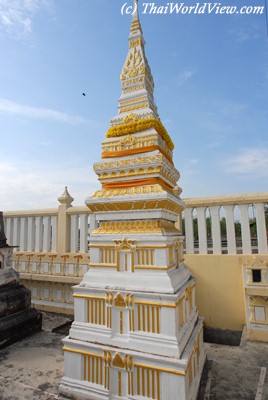 |
| Buddhist cemetary |
|---|
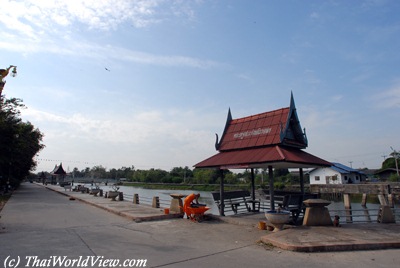 | Such ceremonies can be called "SAK BANG SUKUL" (ชักบังสุกุล) and do happen around Songkran period. |
| Buddhist temple |
|---|
| Water is also poured on the soil to give good deeds to dead people. | 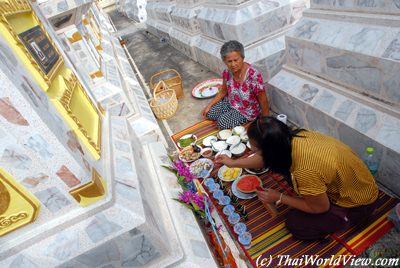 |
| Buddhist cemetary |
|---|
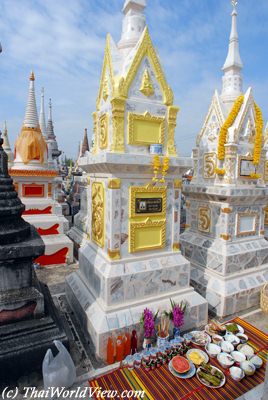 | Ceremony is over and then food is left behind. |
| Buddhist cemetary |
|---|
| Before leaving, Thai people sometimes warn the caretaker of the temple or the cemetery. | 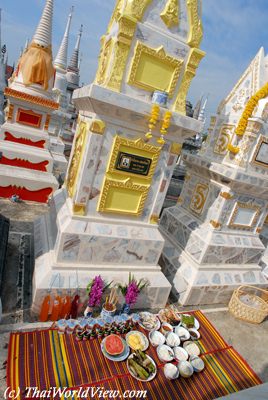 |
| Buddhist cemetary |
|---|
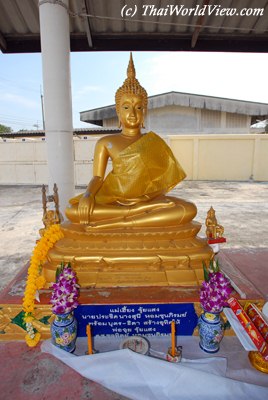 | Poor people from the neighbourhood come to get the food. It is good deed towards dead people and good deed towards poor people. |
| Buddhist cemetary |
|---|
| Offerings include food (steamed rice, chicken, shrimps, fruits, dessert such as mango sticky rice, spicy sauce, fish, vegetables...), flowers and lit incense sticks. | 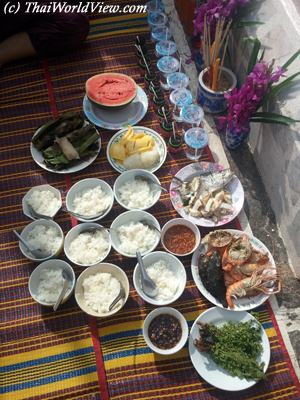 |
| Buddhist cemetary |
|---|
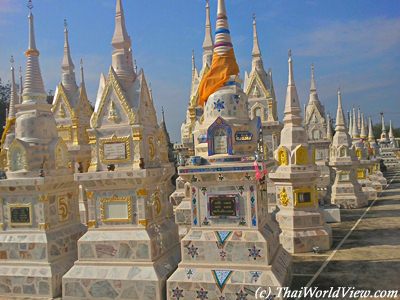 | Buddhist cemetaries are always peaceful but Thai people avoid them at nighttimes due to spirits beliefs. |
| Buddhist cemetary |
|---|




























Không có nhận xét nào :
Đăng nhận xét